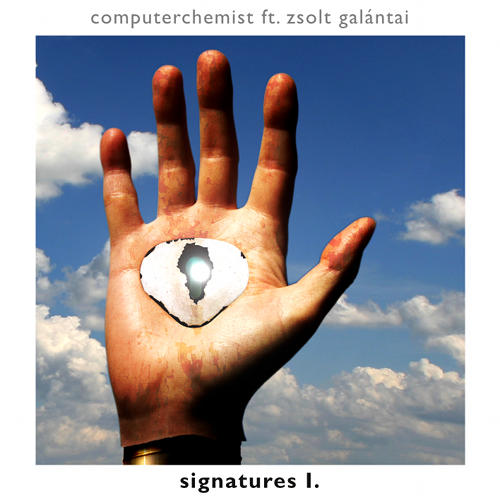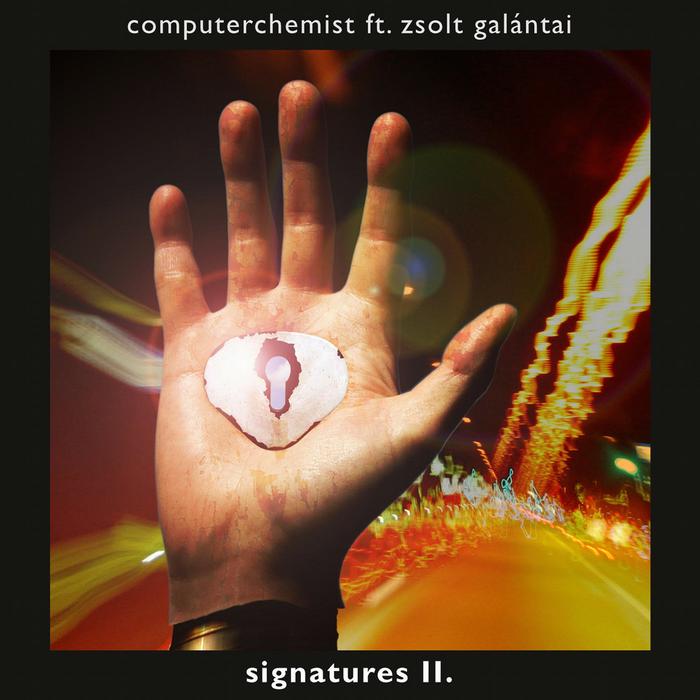 Computerchemist is headed up by multi-instrumentalist Dave Pearson, an English musician currently residing in Hungary. In 2011 Pearson met Budapest based drummer Zsolt Galántai through Facebook and the two decided to meet and see if any musical magic was possible. Pearson was so impressed with Galántai’s ability to play his music that he came up with the idea of creating Berlin School music with the addition of real drums and guitar, and, as Pearson describes, “strange time signatures to boot”. The time signatures used, very few in 4/4, are the inspiration for the title of these two albums. Pearson set various click tracks, encouraged Galántai to solo, and recorded it all. They ended up with a variety of “sequence-locked” drum sessions, and Pearson feels that Galántai in a way composed each of the tracks on Signatures because the music was built around his drumming. Signatures I and II are fully 70 minutes of music each and separated by what Pearson considers the lighter and darker tracks. So there you have a little insight into how the albums came together.
Computerchemist is headed up by multi-instrumentalist Dave Pearson, an English musician currently residing in Hungary. In 2011 Pearson met Budapest based drummer Zsolt Galántai through Facebook and the two decided to meet and see if any musical magic was possible. Pearson was so impressed with Galántai’s ability to play his music that he came up with the idea of creating Berlin School music with the addition of real drums and guitar, and, as Pearson describes, “strange time signatures to boot”. The time signatures used, very few in 4/4, are the inspiration for the title of these two albums. Pearson set various click tracks, encouraged Galántai to solo, and recorded it all. They ended up with a variety of “sequence-locked” drum sessions, and Pearson feels that Galántai in a way composed each of the tracks on Signatures because the music was built around his drumming. Signatures I and II are fully 70 minutes of music each and separated by what Pearson considers the lighter and darker tracks. So there you have a little insight into how the albums came together.
Signatures I opens with Caterpillar Pirouette, which features an interesting combination of sequenced and cosmic Prog keyboards, and indeed the rhythmic pulse and patterns of the drums add muscle and spice to the music. All together it’s like a blend of Rubycon/Phaedra era Tangerine Dream and Eloy at their spaciest, with Steve Hackett sitting in on guitar. Dobdub is next, and, as the title suggests, has a Dub pulse. Though the drums bop along steadily in a jazzy style, it fits in nicely with the Dub vibe. There’s also a haunting violin sounding melody and sparse keys that create a passionately somber mood, and I like the contrast with the energetic drumming and electro-grooving Dub. The nearly 16 minute Zsoltmatic-10 is the epic of the set. It starts off very much like mid-70s Tangerine Dream, until around 4 minutes when the drums kick in and work in tandem with the sequenced keys to create a swinging rock groove, nicely augmented by slow but intense guitar soloing. Killer Space-Prog with a Tangerine Dream meets Pink Floyd feel. Corporatosaur has a pleasant principle melody and spacey orchestral keys, but is also backed by slightly avant-garde sequenced patterns, like Pearson might be exploring his inner Philip Glass. It isn’t until much later that the rhythm section kicks in, the bass having a potent hypnotic drone, and the guitar ripping out killer licks for the finale. Six Phase Mains is a keyboard heavy Space-Prog piece with mind-bending guitar licks and solidly anchored by the drums. Convection Of The 9 continues this theme but with a kind of symphonic Ozric Tenatcles feel. Broken Daliuette is a little different, being a quirky, melodic, avant-space-pop tune that, like most of the music on Signatures, takes on a rhythmic turbo charge when the drums kick in. Landform 2012 closes Signatures I, and is an updated version of the title track from the 2007 Computerchemist album of the same name. This is one of the pieces presented to Galántai when he and Pearson first met, and is listed as bonus track, which in the case of the Signatures albums means the only tracks played in 4/4. At 4 minutes it’s also one of the shortest, but packs a punch all the same, being an expansive slab of symphonic Space-Prog.
 So those are the “lighter” tracks. Signatures II opens with Strangeness In 13, which has a piano melody that gives it a Gothic flavor, backed by orchestral Melloton-ish keys, beautiful emotive guitar licks and steady drumming. Goodbye, Moszkva Tér is a cool grooving space rocker with fiery guitar soloing throughout. The drums, keys and sequenced patterns jam along steadily while the guitar trips along, and all having to dodge meteor shower space electronics. Floor Zero features a cool and strange combination of symphonic, spaced out Prog and electro-robotic rock, along with ripping cosmic jazz-fusion guitar fills. We’re deep into Prog territory on Commution, with heavy guitar driven rock that sounds like Steve Hackett’s early solo albums, plus a dash of Adrian Belew tossed into the licks. The music is continually shifting gears, transitioning to ominously quiet Gothic piano interludes, tickling-the-ivories jazzy swing segments, and Keith Emerson styled keys, always returning to the main high powered theme. LOTS happening on this track! High intensity Space-Prog is the order of the day on Forgotten Memory, with buzzing and whirring electronic waves, multiple layers of keyboards, and spaced out guitar licks. Smeem starts off as a cool combination of darkly intense bass/drum rhythms and ambient guitar exploration. Then the guitar does a 180 and veers into smoldering Bluesy rocking, soon adding distinctly Rick Wright flavored keys, and now we’re in a Pink Floyd realm with freaky electronics and rhythms like you’ve never heard on a Pink Floyd album. The Needs Of The Many is an eerie but rocking Space-Prog piece that sounds like it could be the soundtrack theme to a sci-fi flick. And, finally, Bongo In 4 is another track with a cosmic Pink Floyd flavor, featuring Space-Blues guitar jamming over a steadily rocking rhythm section and jazzy grooving keys. Later the music veers away from the Floyd style and a violin sound takes over from the guitar for a tug-at-the heartstring melodic passage, backed by robotic keyboard rhythms and rockin’ drumming.
So those are the “lighter” tracks. Signatures II opens with Strangeness In 13, which has a piano melody that gives it a Gothic flavor, backed by orchestral Melloton-ish keys, beautiful emotive guitar licks and steady drumming. Goodbye, Moszkva Tér is a cool grooving space rocker with fiery guitar soloing throughout. The drums, keys and sequenced patterns jam along steadily while the guitar trips along, and all having to dodge meteor shower space electronics. Floor Zero features a cool and strange combination of symphonic, spaced out Prog and electro-robotic rock, along with ripping cosmic jazz-fusion guitar fills. We’re deep into Prog territory on Commution, with heavy guitar driven rock that sounds like Steve Hackett’s early solo albums, plus a dash of Adrian Belew tossed into the licks. The music is continually shifting gears, transitioning to ominously quiet Gothic piano interludes, tickling-the-ivories jazzy swing segments, and Keith Emerson styled keys, always returning to the main high powered theme. LOTS happening on this track! High intensity Space-Prog is the order of the day on Forgotten Memory, with buzzing and whirring electronic waves, multiple layers of keyboards, and spaced out guitar licks. Smeem starts off as a cool combination of darkly intense bass/drum rhythms and ambient guitar exploration. Then the guitar does a 180 and veers into smoldering Bluesy rocking, soon adding distinctly Rick Wright flavored keys, and now we’re in a Pink Floyd realm with freaky electronics and rhythms like you’ve never heard on a Pink Floyd album. The Needs Of The Many is an eerie but rocking Space-Prog piece that sounds like it could be the soundtrack theme to a sci-fi flick. And, finally, Bongo In 4 is another track with a cosmic Pink Floyd flavor, featuring Space-Blues guitar jamming over a steadily rocking rhythm section and jazzy grooving keys. Later the music veers away from the Floyd style and a violin sound takes over from the guitar for a tug-at-the heartstring melodic passage, backed by robotic keyboard rhythms and rockin’ drumming.
Wow, there is so much happening on this challenging and difficult to describe 2 1/2 hours of music. Galántai’s drumming often contrasts sharply with the main musical themes, making for some classic Progressive Rock rhythmic gymnastics that are a hallmark of what the Signatures sets are all about. And, musically, many disparate elements contrast and cooperate in ways that make the music stand up to repeated listens. In short, if you dig heavy doses of Space in your Prog, check these out.
For more information you can visit the Computerchemist web site at: http://computerchemist.bandcamp.com
Reviewed by Jerry Kranitz
